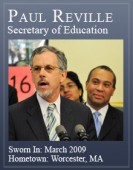As 27 other states agreed to adopt the “Common Core Standards,” the state of Massachusetts held out, arguing that its own standards were of higher quality — and better. On Monday night, state Republicans urged education leaders to delay a vote on replacing the standards. The whole issue became entangled in state politics, the Boston Globe reported.
But with $250 million in Race to the Top money at stake, the state’s education officials on Wednesday voted unanimously to replace their own hard-fought standards with those advocated by the Obama administration, the Associated Press reported.
This decision represents a big turnaround for a state that worked hard to craft — and defend — its own academic standards. As The Hechinger Report noted last month, “Massachusetts is proud of its detailed and rigorous state standards. The math standards require elementary school students to solve word-problems involving fractions, decimals and percents. By seventh grade, students solve simple algebraic equations and analyze linear change with two variables. In English Language Arts, third-graders learn grammar by identifying basic parts of speech, and fifth-graders explore hyperbole and similes. Ninth- and tenth-graders are expected to ‘use knowledge of Greek, Latin, Norse mythology, the Bible and other works often alluded to in British and American literature to understand the meaning of new words.’”
The vote in Massachusetts came on the same day the Thomas B. Fordham Institute released an analysis of standards in all 50 states, which concluded that the proposed new standards are more rigorous than those in three-quarters of all states. The report found not a single example of a state with standards superior to the common core in math, although three were deemed superior in English language arts: California, the District of Columbia and Indiana.
Despite the strong sentiments of education officials in Massachusetts, the Fordham report found that the state’s standards were not necessarily better than the common core — they called it “too close to call.”
With money at stake, however, Massachusetts officials came away with a new viewpoint on Wednesday.
“This is good for our kids and good for our students,” Massachusetts Education Secretary Paul Reville was quoted as saying.
The New York Times reported that U.S. Secretary of Education Arne Duncan is “ecstatic” at the support for the new standards, which define what students should learn in English and math every year from kindergarten through high school. The topic was discussed in depth last weekend at a Hechinger Institute on Education and the Media seminar for reporters new to the education beat, with insight from Susan Pimentel — who helped write the standards — and Stephanie Shipton of the National Governors Association.




